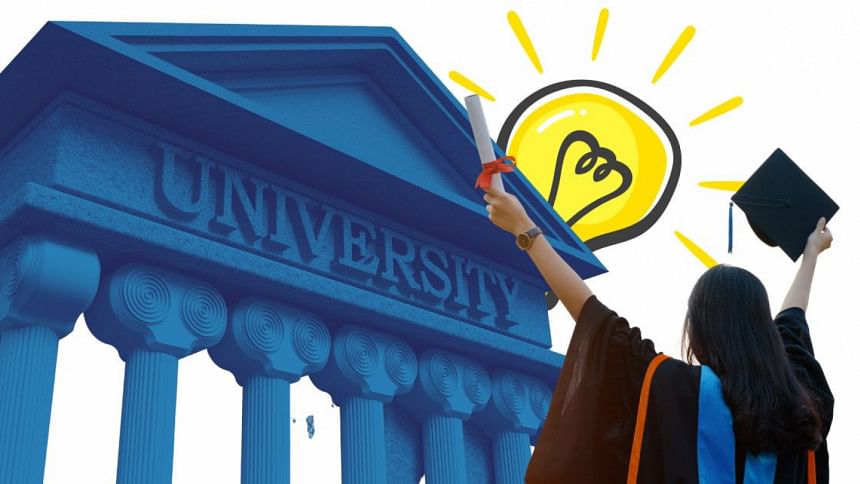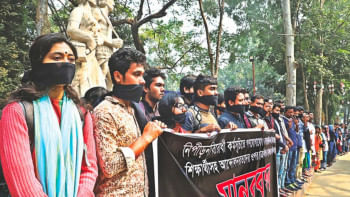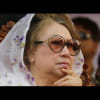The hurdles to academic freedom in Bangladesh

Academic freedom is a special concern of freedom of speech and falls within the periphery of Article 39 of Bangladesh's constitution. Generally, academic freedom is perceived as freedom of universities in terms of research, class lectures, and other professorial activities. As universities are considered the marketplace of ideas, radical or new thoughts are bound to emerge from there. The solemn duty of universities is to shape and refine these ideas.
We may classify academic freedom into two categories: 1) the teacher's freedom to conduct classes or research and 2) students' freedom to carry out innovative activities within the domain of their knowledge. From the perspective of teachers, there are three kinds of speeches, namely core academic speech, intramural speech, and extramural speech. Core academic speeches focus on discussions regarding the syllabus, which we perceive as freedom of teaching. Secondly, intramural speeches are concerned with opinions relating to public issues. Lastly, extramural speeches concern political issues, wherein teachers convey opinions regarding political issues from a critical point of view. Core academic and intramural speeches come under the protection window of freedom of speech. Whether extramural speeches fall under the same purview remains a matter of discussion.
To ensure the independence of academia, Bangladesh needs to give special attention to the freedom of universities through the lens of Article 39 of the constitution. Otherwise, universities, teachers, and students may hesitate to ask controversial questions, crunch controversies, make inquiries, and search for uncomfortable truths.
But in the current Bangladeshi scenario, even core academic and intramural speeches are not well protected by the constitutional regime. According to Unesco, there are four academic freedoms for teachers: freedom to teach and discuss, freedom of research and publishing the results thereof, freedom to freely express their opinion about the institution or system in which they work, and freedom from institutional censorship. Allegedly, obstructions exist to three of these four freedoms in Bangladesh. Political influence on the appointment of vice-chancellors, faculty members, or any other administrative officers has intensified these obstructions. Apart from this, teachers with differing ideologies or beliefs face backlash during classes. Is it possible to build a thoughtful nation and practice liberal democracy without unfettered academic freedom in the classroom?
Meanwhile, the Cyber Security Act, 2023, remains a hindrance to freedom of speech in Bangladesh. While media freedom was compromised by the CSA's previous form, the Digital Security Act, few talk about how the law also impinges on academic freedom in Bangladesh. Recently, Khulna University of Engineering and Technology (KUET) took it a step further by ordering its faculty members to follow the Social Media Usage Guidelines in Government Offices, 2019 when airing any opinions on social media. These guidelines were supposedly adopted to regulate and monitor the social media activities of government officials. But KUET, being an independent body from the ambit of the government's direct control, could have protected the freedom of speech (intramural and extramural speeches) of its faculty members. While the state does have managerial authority to look after the different activities of various stakeholders, it should never meddle with academic freedom in universities.
In the Wiemann vs Updegraff case of 1952, Justice Felix Frankfurter wisely defined professors as the "priests of our democracy." As such, teachers' academic freedom should remain unfettered, uncensored, and not interfered with by the state's managerial control. Only functional necessity can incur censorship or interference, but even that must coincide with the practices and principles of freedom of speech. Unfortunately in Bangladesh, the scenario is not so.
To ensure the independence of academia, Bangladesh needs to give special attention to the freedom of universities through the lens of Article 39 of the constitution. Otherwise, universities, teachers, and students may hesitate to ask controversial questions, crunch controversies, make inquiries, and search for uncomfortable truths. To encourage universities' role of nation-building and social reformation, the state should encourage core academic speeches among teachers. Through this, Bangladesh can free its academia of political, religious, ideological, and/or social influence.
Sakhawat Sajjat Sejanis lecturer in the Department of Law at Feni University.
Views expressed in this article are the author's own.
Follow The Daily Star Opinion on Facebook for the latest opinions, commentaries and analyses by experts and professionals. To contribute your article or letter to The Daily Star Opinion, see our guidelines for submission.

 For all latest news, follow The Daily Star's Google News channel.
For all latest news, follow The Daily Star's Google News channel. 









Comments